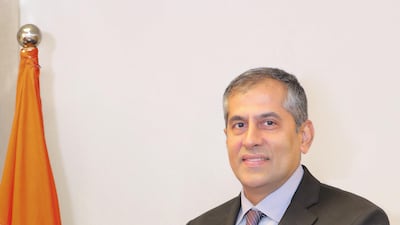Solar power, food security, cyber safety and artificial intelligence are priority areas of Emirati-Indian co-operation, New Delhi’s envoy to the UAE said.
Indian ambassador Pavan Kapoor said the focus in the future would be to strengthen the comprehensive strategic partnership, with energy an important area of co-operation.
Mr Kapoor spoke to The National in a wide-ranging interview on the eve of India's 71st Republic Day celebrations on Sunday, which marks the date India's constitution came into effect.
“Our relations are on an upward trajectory and we are working to ensure that this trend continues,” he said.
“In the field of energy, our ties have moved from being a buyer-seller relationship to that of strategic interdependence, with both countries investing in each other’s energy sector.
“We are also working to expand our co-operation in emerging technologies such as artificial intelligence and cyber security, and constantly exploring new opportunities for co-operation.”
Mr Kapoor said India and the UAE were working for a more sustainable and climate-friendly future by expanding capacities in renewable energy, food security and infrastructure.
Co-operation on food security and infrastructure are other important sectors.
“UAE entities are expected to invest up to $7 billion (Dh25.71bn) in India as part of the India-UAE food security corridor. Another focus area will be facilitating the country’s commitment to investing $75bn in infrastructure development in India,” he said.
Mr Kapoor acknowledged the role of the 3.3 million Indians in the UAE, its largest expatriate group, in building close ties.

“We cherish and value your contribution to the growth story of both India and the UAE,” Mr Kapoor said as part of a Republic Day message.
“We deeply appreciate your role in nurturing this relationship and will ensure that you continue to play a significant part as we attempt to further deepen and strengthen these ties.”
The UAE is India’s third-largest trade partner, with annual bilateral trade of about $60bn. The Emirates is also the fourth-largest crude oil exporter for India. But it is the historical connection between the countries that has cemented ties.
“This people-to-people connection is one of the strongest factors impacting our relationship,” Mr Kapoor said. “Relations between our two countries date back hundreds of years, before India and the UAE assumed their modern forms.
“Ties between our peoples are ancient, generational and emotional. So the cultural connection is very strong.”
Mr Kapoor said rapport between leaders has helped the partnership.
“The UAE is one of the very few countries that Prime Minister Narendra Modi has visited often in the last five years.”
Mr Modi has visited the UAE three times in four years. He received the Order of Zayed, the nation's highest civilian award from Sheikh Mohamed bin Zayed, Crown Prince and Deputy Supreme Commander of the Armed Forces, in August last year.
Sheikh Mohamed was the chief guest at India’s Republic Day celebrations in 2017, his second visit to the country in less than a year.
In the past few months, Indians in the UAE have expressed concern about protests back home over a new law offering citizenship to migrants including Christians and Hindus who fled persecution in Bangladesh, Pakistan and Afghanistan and settled in India.
Critics say it should make the same provisions for Muslim migrants, but the government says it wants to give citizenship to religious minorities who face persecution in Muslim-majority countries.
“Our message to the community here is not to believe misleading or false information in the print or social media and instead go by the facts,” he said.
“The law and order situation in India is fully under control and there is no need to panic. India is a robust democracy, with ample room for debate and constructive opposition. Every Indian citizen is free to peacefully express his or her concern on any subject, including the Citizenship Amendment Act recently passed by the parliament of India.”
With Dubai Expo 2020 nearing, Mr Kapoor said the country was “working hard” to prepare an impressive pavilion.
“Expo 2020 is special for the UAE but also important for India,” he said.
India has committed $50 million for one of the Expo's largest pavilions. It will feature a large image of Mahatma Gandhi and incorporate Bollywood flair inside.


